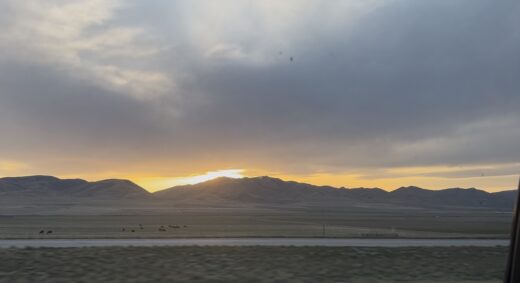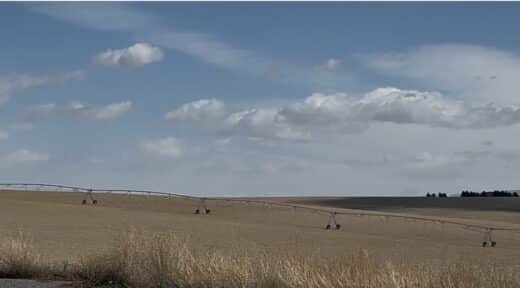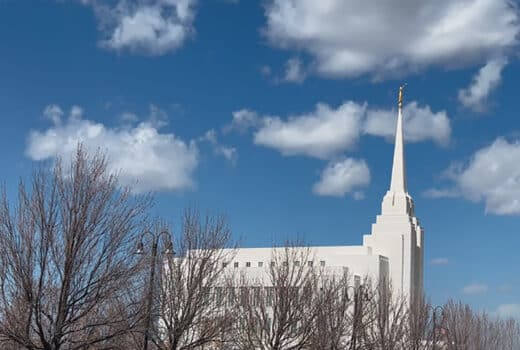
“The drive from Salt Lake City, Utah, to Idaho Falls, Idaho, was three hours of pure beauty.”
The drive from Salt Lake City, Utah, to Idaho Falls, Idaho, was three hours of pure beauty. On every side there were mountains, cows, and the occasional herd of mule deer. Not to mention I’d just eaten a burger from In-N-Out, a restaurant that doesn’t exist in the South. The hotel where I stayed in Idaho Falls was clean and comfortable. There was a chest of drawers by my bed. In the top drawer there were two books — the book of Mormon, and the Bible. Joseph Smith’s teaching lay on top of the Bible.
The lengthiest conversation I’ve ever had with a Mormon was on the airplane headed to Salt Lake City. His name was Dylan*, and his sweet infant daughter was Grace*. I thoroughly enjoyed talking with him for almost three hours and occasionally holding his young daughter on my lap. Dylan was a former Mormon missionary to Bolivia, the same country I lived in for five years as a child where my parents were evangelical missionaries. We found out that we had both been living in Bolivia around the same time those many years ago. And here we were, sitting next to each other on the plane. We talked about our favorite Bolivian foods. And we talked a lot about faith.
I took on the posture of a learner and asked Dylan dozens of questions about his faith. He let me borrow his cellphone and pulled up his LDS (Latter-day Saints) app to let me read about Joseph Smith, the founder of Mormonism. I learned a lot. And honestly, what Dylan gave me to read was easy to understand and convincing. It sounded good.
Dylan was good at conversation and had a missionary’s heart. He wanted me to believe what he believed. He was gracious with my questions, and sought to answer them with sincerity, often responding with, “That’s a good question,” or, “I’m not sure.” He would then seek to answer my questions as best he could. At the end of our time, he gave me his number and told me to text him if I had any more questions. I honestly could sense that I wasn’t a project to him; he cared about me.
Same Words, But Different Dictionary
Dylan was sweet, nice, and sincere. But he was lost. Not just lost, but accursed (Gal. 1:6–24).
I think what Paul, the apostle, said in the Book of Romans about the Jews can also apply to Latter-day Saints.
“For I bear them witness that they have a zeal for God, but not according to knowledge. For, being ignorant of the righteousness of God, and seeking to establish their own, they did not submit to God’s righteousness. For Christ is the end of the law for righteousness to everyone who believes” (Rom. 10:2–4).
Without plunging into the depths of Mormon beliefs, one could say they believe in a salvation of grace and works. The most confusing part of talking with a Mormon is distinguishing truth from error in what’s said. Mormons say the right thing but mean something totally different.
For example, a Mormon might say, “I believe that God forgives us of our sins and that Jesus gives us access to the Father.” If you’re like me, you don’t see anything wrong with that statement. Your gut reaction is, “That’s true!” And from a biblical perspective, I agree.
But a Mormon who says that statement isn’t expressing it from a biblical perspective. They are thinking of a different god, a different salvation, and a different gospel altogether. Therefore, that statement becomes false when interpreted through their worldview.
How so?
Yes, they believe that God forgives them, but they also believe that baptism is necessary for salvation and that we’re not totally depraved. “Salvation” for a Mormon is all about themselves and happiness, not God’s glory. The throne of a Mormon’s heart is self, not God.
Yes, they believe that Jesus gives us some kind of access to heaven, but there’s different levels of heaven — and the highest level of heaven is for the best Mormons, the baptized and married ones. Jesus opens the door to salvation and then you work the rest of the way up.
Yes, they believe that Jesus gives us access to “our heavenly father,” but what father? It’s not our Father, because Mormons don’t believe in the Trinity, don’t believe that Jesus is God, and don’t believe that Jesus is eternal. They think He was created.
So, the whole statement falls apart when we realize that they’re using the name “Jesus” to represent a false god of their own making.
“They use the same words as we do, but with a different dictionary,” said Travis Kerns, associational mission strategist for Three Rivers Baptist Association.
When a Mormon says, “I believe that God forgives us of our sins and that Jesus gives us access to the Father,” they’re unintentionally the most disguised and deceived lost person.
That’s tragic. That’s the epitome of deception. “… (F)or even Satan disguises himself as an angel of light” (2 Cor. 11:14b). Look at the language Paul uses in 2 Corinthians 11:4 when writing to Corinth about those who preach a different gospel: “For if someone comes and proclaims another Jesus than the one we proclaimed, or if you receive a different spirit from the one you received, or if you accept a different gospel from the one you accepted, you put up with it readily enough” (emphasis mine).
A Peaceful, Quiet, Moral Highway to Hell
So what’s my point?

“But when I walked in the Rexburg neighborhood in Idaho, I saw huge houses and wide-open fields ready for planting.”
Think of the most sinful place you know. Most people who think of lostness think of places like Los Angeles or Las Vegas, where sin is blatant and obvious. There are strip clubs, bars, places to gamble, and inappropriate billboards. According to someone who’s visited there, you may even find a man passing out a card to a young boy with the name and number of a prostitute. It’s outright evil. When we go to a city like that, we think: sin.
But when I walked in the Rexburg neighborhood in Idaho, I saw huge houses and wide-open fields ready for planting. That sounds like a healthy place, right? Yards were tidy. People were nice. And there were no beer bottles or coffee grounds* in sight. Walking through a Rexburg neighborhood is beautiful, quiet, and peaceful looking from the outside.
But that neighborhood and all of Rexburg is filled with families of unbelievers on their way to hell. According to ARDA (Association of Religion Data Archives) and specified data research from Kerns — author of The Saints of Zion: An Introduction to Mormon Theology — Madison County (where Rexburg is located) is 0.4 percent Christian. Using International Mission Board terms, that’s considered an unengaged, unreached people group.
Tiny, Faithful Presence
But there is a faithful independent Baptist church located there.
“Rexburg is a very proud place,” said Joe Lacy, pastor of Grace Baptist Church in Rexburg. “Everything about the culture in Rexburg is about what’s on the outside. But do not mistake the sincerity.”
Lacy said the people of Rexburg are proud of their accomplishments, strong in their beliefs, and strong in their families. He said their lack of honesty is frustrating.
But his church is set apart from the proud culture of Rexburg.
“We’re the little, tiny church in Rexburg, and I believe God has placed our little, tiny church there on purpose because we are a testimony of His humility,” he said. “Everything that God does is about humility.”
Takoda Orellana, a born-again believer who converted from Mormonism, said, “I’m going to be honest, when I first showed up to Grace [Baptist Church] it was pathetic. … It’s a dinky, little log cabin church. It’s falling apart. But it’s only there that I felt the Holy Spirit so strongly.”
Despite the dilapidated building, Orellana said he finds the presence of God where two or more are gathered in His name.
Orellana studied virtual design and construction at Brigham Young University-Idaho (highly Mormon-populated university) and used to design Mormon temples. He said the temples are majestic and white. But he compared them to the white-washed tombs that Jesus spoke of in Matthew 23:27.

“He said the temples are majestic and white. But he compared them to the white-washed tombs that Jesus spoke of in Matthew 23:27.” The Rexburg Idaho Temple is located near BYU-Idaho.
When Orellana first became a Christian, he’d attend the Baptist church and then go to his Mormon church afterwards. He said the difference was day and night. He said he loved going to his Mormon church because he’d produce all these feelings within himself.
“But at the Baptist church, it wasn’t pretense,” he said. “It was like, there was a truth. And the feelings flowed from that truth. Except, when I was a Mormon, there were my feelings that dictated my truth.”
Orellana didn’t want to be caught stepping into an evangelical church until after he came to faith through online Christian content, and reading through the Book of John on his own.
He said during his entire Christian journey, he’d never met a single Christian person who shared the true gospel with him. “I made it to faith in Christ [through online resources], but what about all the other ones? What about all the other lost sheep?” he said.
Do We Love Them?
Most Mormons don’t know that they’re in sin and they have little to no Christians around them to tell them the truth in love. They are deceived, but God still loves them. The question is whether we love them.
When I came back to South Carolina, I Googled apartments in Utah to see if I could move out west. But a wise, humble woman encouraged me: What if your immediate response to need wasn’t always to do something but to pray?
So, let’s earnestly pray for God to send more laborers into His harvest (Matt. 9:35–38).
“When he saw the crowds, he had compassion for them, because they were harassed and helpless, like sheep without a shepherd. Then he said to his disciples, ‘The harvest is plentiful, but the laborers are few; therefore pray earnestly to the Lord of the harvest to send out laborers into his harvest’” (Matt. 9:36–38 ESV).
* Names changed for privacy. (Note: Mormons aren’t allowed to drink coffee or tea.)

